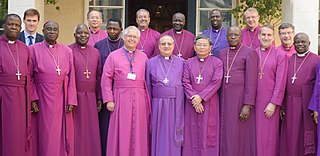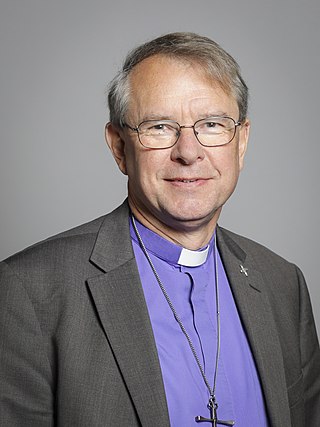
The Anglican Communion is the third largest Christian communion after the Roman Catholic and Eastern Orthodox churches. Formally founded in 1867 in London, the communion has more than 85 million members within the Church of England and other autocephalous national and regional churches in full communion. The traditional origins of Anglican doctrine are summarised in the Thirty-nine Articles (1571). The archbishop of Canterbury in England acts as a focus of unity, recognised as primus inter pares, but does not exercise authority in Anglican provinces outside of the Church of England. Most, but not all, member churches of the communion are the historic national or regional Anglican churches.

The Church of Uganda is a member province of the Anglican Communion. Currently there are 37 dioceses which make up the Church of Uganda, each headed by a bishop.

The Bishop of Southwark is the ordinary of the Church of England Diocese of Southwark in the Province of Canterbury.
The Anglican dioceses of Buganda are the Anglican presence in the Central Region, Uganda ; they are part of the Church of Uganda. The remaining dioceses of the Church are in the areas of Eastern Uganda, of Northern Uganda, of Ankole and Kigezi, and of Rwenzori.
Balokole is an African evangelical Christian reform movement started by Simeon Nsibambi and John E. Church in the 1930s. The Balokole arose within the East African Revival Movement which sought to renew the Protestant churches in Uganda, Kenya, Tanganyika, and Ruanda-Urundi. Despite its theological roots in the Western revival movement of the eighteenth and nineteenth centuries, the Balokole evolved as an indigenous African movement. The term Balokole can be translated as "the saved ones" or "the chosen".
The Anglican realignment is a movement among some Anglicans to align themselves under new or alternative oversight within or outside the Anglican Communion. This movement is primarily active in parts of the Episcopal Church in the United States and the Anglican Church of Canada. Two of the major events that contributed to the movement were the 2002 decision of the Diocese of New Westminster in Canada to authorise a rite of blessing for same-sex unions, and the nomination of two openly gay priests in 2003 to become bishops. Jeffrey John, an openly gay priest with a long-time partner, was appointed to be the next Bishop of Reading in the Church of England and the General Convention of the Episcopal Church ratified the election of Gene Robinson, an openly gay non-celibate man, as Bishop of New Hampshire. Jeffrey John ultimately declined the appointment due to pressure.

The Global South Fellowship of Anglican Churches (GSFA), formerly known as Global South (Anglican), is a communion of 25 Anglican churches, of which 22 are provinces of the Anglican Communion, plus the Anglican Church in North America and the Anglican Church in Brazil. The Anglican Diocese of Sydney is also officially listed as a member.
The Province of the Anglican Church of Burundi is a province of the Anglican Communion, located in East Africa between Tanzania, Rwanda, Kenya, and the Congo. The Archbishop and Primate of Burundi is Sixbert Macumi.

The Anglican Church in North America (ACNA) is a Christian denomination in the Anglican tradition in the United States and Canada. It also includes ten congregations in Mexico, two mission churches in Guatemala, and a missionary diocese in Cuba. Headquartered in Ambridge, Pennsylvania, the church reported more than 1,000 congregations and more than 128,000 members in 2023. The first archbishop of the ACNA was Robert Duncan, who was succeeded by Foley Beach in 2014. In June 2024, the College of Bishops elected Steve Wood as the third archbishop of the ACNA. Authority was transferred to him during the closing Eucharist at the ACNA Assembly 2024 conference in Latrobe, Pennsylvania.
The Anglican Church of Rwanda is a province of the Anglican Communion, covering 13 dioceses in Rwanda. The primate of the province is Laurent Mbanda, consecrated on 10 June 2018.

Paul Roger Butler is a retired British Anglican bishop and a former Lord Spiritual of the House of Lords. He was installed and enthroned in Durham Cathedral on 22 February 2014 and was the Bishop of Durham, the diocesan bishop of the Diocese of Durham, from 20 January 2014 to 29 February 2024. On 12 September 2013 it was announced that he had been appointed as bishop-designate of Durham He was previously bishop of Southwell and Nottingham. He was installed at Southwell Minster on 27 February 2010. He served as the suffragan bishop of Southampton in the Diocese of Winchester from 2004 until 2010.

Gahini is a sector and village in Kayonza District, Eastern Province, Rwanda. It is situated on a hill, at an altitude of 1,520 metres (4,990 ft) above sea-level, close to the eastern edge of Lake Muhazi and 73 kilometres (45 mi) by road from the capital, Kigali. The village is the centre of one of the nine dioceses of the Eglise Episcopale au Rwanda, the Anglican church of Rwanda, and one of the four Rwandan sites chosen by the Church Missionary Society, who built a large mission, hospital and schools in the village.
Onesphore Rwaje is a Rwandan Anglican bishop. He was the Primate of the Anglican Church of Rwanda from 2011 to 2018. He is married and has five children.
The East African Revival was a movement of renewal in the Christian Church in East Africa during the late 1920s and 1930s. It began on a hill called Gahini in then Belgian Ruanda-Urundi in 1929, and spread to the eastern mountains of Belgian Congo, Uganda Protectorate, Tanganyika Territory and Kenya Colony during the 1930s and 1940s. The revival reshaped the Anglican Church already present in East Africa and contributed to its significant growth from the 1940s into the 1970s.

Léon-Paul Classe, M.Afr. was a Catholic priest who was Vicar Apostolic of the Apostolic Vicariate of Ruanda, in what is now Rwanda, from 1922 until his death in 1945. During his time as a missionary priest and then bishop a great many Rwandans were converted to Christianity. Classe was influential in persuading the Belgian colonial administration to favor the Tutsis as a ruling caste in the country over the Hutu majority.
John Edward Church, commonly referred to as Joe Church, was a British missionary who served with Church Mission Society (CMS). Dr. Church served primarily in Rwanda and Uganda. He left England in 1927 and served as a missionary for 44 years, alternating between medical and evangelistic missions. He is widely known for playing a key role in the East African Revival. Additionally he served as a doctor in Rwanda for over a decade and constructed hospitals and a church. He has been recognized for his work by governments in East Africa and Europe.
Laurent Mbanda is a Rwandan Anglican bishop. He was the bishop of the Diocese of Shyira when he was elected the fourth archbishop and primate of the Province of the Anglican Church of Rwanda on 17 January 2018, being enthroned on 10 June 2018.
The Anglican dioceses of Burundi are the Anglican presence in Burundi; together they form the Province of the Anglican Church of Burundi. The Anglican churches of the area were under the authority of the Archbishop of Canterbury until 1965, when the Province of Uganda and Ruanda-Urundi was created; Burundi was then part of the Province of Rwanda, Burundi, and Boga-Zaire from 1980 until its own church province was erected in 1992.
The fifteenth Lambeth Conference was an assembly of bishops of the Anglican Communion convened by the archbishop of Canterbury, Justin Welby, between 27 July and 7 August 2022. It was the first Lambeth Conference to be held since 2008.
The Anglican Network in Europe (ANiE) is a small Christian denomination in the Anglican tradition with churches in Europe. Formed as part of the worldwide Anglican realignment, it is a member jurisdiction of the Global Fellowship of Confessing Anglicans (GAFCON) and is under the primatial oversight of the chairman of the GAFCON Primates Council. ANiE runs in parallel with the Free Church of England (RECUK). GAFCON recognizes ANiE as a "proto-province" operating separately from the Church of England, the Scottish Episcopal Church, the Church in Wales and other Anglican Communion jurisdictions in Great Britain and the European continent. ANiE is the body hierarchically above the preexisting Anglican Mission in England; the former is the equivalent of a province whilst the latter is a convocation, the equivalent of a diocese.








